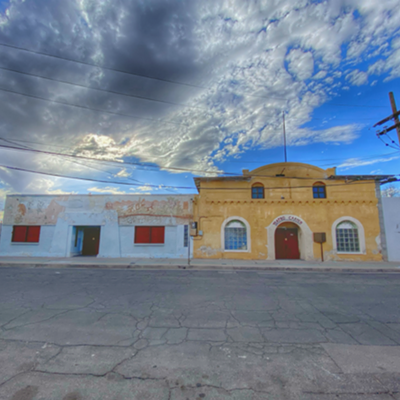Even in a room filled with budding barristers, you won't find many people eager to argue with Trent Munson.
The man was nearly killed on March 21, 2008, by a drunk and drugged driver who careened into his motorcycle at more than 100 mph.
Today, standing behind the podium at the UA's James E. Rogers College of Law, he recounts his long recovery and the mental toll on his family. His grim story sums up this panel discussion honoring National Crime Victims Rights Week, which was April 18-24.
"My life and my family's lives have been forever altered," says Munson. "... There isn't a day that goes by that I don't relive what happened."
Then Mr. Munson stops and struggles to regain his composure.
Because Arizona voters amended the state Constitution in 1990 to include victims' rights, and because those rights are further detailed in state statutes, Munson was allowed to attend all criminal proceedings regarding his case. He had the right to refuse interview requests from defense attorneys, and to receive prompt restitution from the perpetrator.
At first glance, each of these rights seems quite justified. But scratch beneath the surface, and you'll find a lot of contention over whether they grant victims too many rights, and ultimately pervert the legal process.
"There are certain aspects of victims' rights that are important and can co-exist with civil liberties," says Michael Macleod-Ball, chief legislative and policy council for the American Civil Liberties Union in Washington, D.C. "Some of the rape-shield laws, for example, do a good job at making sure that the kinds of evidence that are being used in criminal proceedings are really relevant to a determination of guilt or innocence. But even with those laws, you can cross the line."
Rape-shield laws limit evidence that can be presented in court about a victim's past sexual history.
"Everybody has sympathy for victims, particularly victims of violent crime," says Macleod-Ball. "Nobody makes any bones about that. But the point of our criminal-justice system is to make sure that the determinations of guilt or innocence are fair to everybody involved. And in fact, it's only the accused whose liberty is on the line. That's why the Constitution focuses on the rights of the defendant."
Others say these laws simply ensure a place at the table for victims. Among them is County Attorney Barbara LaWall, who opened the April 21 panel discussion by asking for a show of hands from crime victims. Nearly every hand shot up.
"If, in fact, you were a victim of a crime when I first started in the Pima County Attorney's Office in 1975, you had no rights," says LaWall. "You had no right to confer with a prosecutor. You had no right to address the judge to talk about conditions of release (of the alleged perpetrator) at the time of arrest. You had no right to be present in the courtroom any time the defendant had the right to be present. ... You had no rights as a victim."
In response, she says, prosecutors prodded the Legislature to pass laws instituting those rights. When that effort stalled, "victims took to the streets with petitions, and gathered enough signatures to place a constitutional amendment on the ballot. In 1990, that constitutional amendment passed. And at that point, victims were afforded rights."
But with those rights came responsibilities—and an extra burden for both prosecutors and judges.
Richard Fields, criminal presiding judge for Pima County Superior Court, was on the panel with LaWall. He says victims' rights create practical concerns: "How do you squeeze 400 people who are attending a court proceeding on behalf of a crime victim into a courtroom with 53 seats?
"How do you ensure that a defendant ... will receive a fair trial from a jury sworn to decide the case on cold, hard evidence, uninfluenced by 400 people who are emotionally charged and demanding justice? These are the kinds of challenges that trial judges face."
Others suggest that victims' rights laws push prosecutors to focus too much on victims—at potential risk to the general public. That point was delineated in a "Prosecutorial Ethics and Victims' Rights: The Prosecutor's Duty of Neutrality," a 2005 paper by Bennett Gershman, who teaches law at New York's Pace Law School.
According to Gershman, the laws offer several benefits to prosecutors, including having a victim in the courtroom to solicit sympathy from a jury, and presenting indisputable evidence of a crime. But they also offer pitfalls. "Despite these advantages," Gershman writes, "a prosecutor cannot align herself exclusively with the victim. A prosecutor also owes an allegiance to constituencies that are independent of the victim—i.e., the general public and the accused."
Following the panel discussion, I raised the question of this balancing act with Tim Nelson, Arizona's chief deputy attorney general. Rather than distorting a prosecutor's loyalties, claims Nelson, victims' rights laws actually benefit the larger society.
"The prosecutor's job is to ensure that the correct perpetrator gets convicted," he says, "and that a sentence gets imposed that's consistent with what society has imposed as the appropriate penalty for the crime."
In other words, the laws can keep overworked prosecutors—pressured to hustle cases through the docket—from making overly lenient plea deals.
"I see it not as a balance too far in favor of victims," he says, "but a reminder that we can't simply choose to expedite our case loads without recognizing the harm that happened to the victim, and ensuring that the victim does receive justice."
But too much of that justice may be steered toward the victim, according to longtime criminal-defense lawyer and current Pima County Public Defender Robert Hirsh. "Theoretically, the state does represent everybody, and not just a particular group of people," he says. "To carve out victims as being some sort of special group that is entitled to certain rights and privileges is a very bad thing for our justice system."
For instance, Hirsh points out that victims in Arizona have the right to refuse pre-trial interview requests from defense attorneys, which can leave the defendants at a huge disadvantage.
And the situation has only grown worse, he says. "That whole universe of victims seems to have grown over the years. They are somehow sacred. They can't be interviewed before trial. We can't talk to them; we can't investigate them because of their 'rights.' I think that has unfairly skewed the system. It's made it far more difficult to get to the truth."






